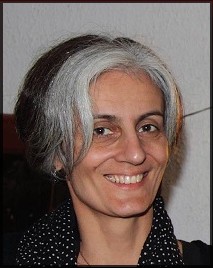Engineer, actress, director, puppeteer… Hélène Cruciani explored many fields before seeing her first novel published, Expéron, a science fiction novel in the vein of Aldous Huxley raising many ethical questions about scientific progress and the right to motherhood. Her second anticipatory novel, September 11, 2061, published by Éditions Néreïah, won the Imaginéreïah Prize in 2016.
Hélène Cruciani agreed to answer questions from Nice Premium about her novel September 11, 2061, whose review has just been published on our site: “The whole ‘geo-political-strategic’ truth about these attacks, which were so unimaginable on their soil, had therefore not been revealed and they had to continue living with that. Those issues thus became the heart of my writing project […]”
Nice Premium: How did the idea for September 11, 2061 come to you? What prompted you to write on this subject?
Hélène Cruciani: I was at a book signing at the Mouans-Sartoux Book Festival, alongside Menolly (editor at Griffe d’Encre), when we discussed the September 11, 2001 attacks. The “conspiracy theories” flooding the internet—controlled demolition of the towers, missile at the Pentagon, etc.—deeply troubled me: so many people were contesting what they called “the official version of the September 11 attacks” that I kept reading and rereading their articles, wondering if their questions were legitimate. In 2008, an international survey revealed that only 46% of respondents thought that the attacks were indeed the work of Al-Qaeda.
A lively debate took place in 2009 on Guillaume Durand’s show “L’objet du scandale,” where Mathieu Kassovitz and Jean-Marie Bigard publicly expressed their “doubts.” Books, like “The Hidden Face of 9/11” by the famed reporter Éric Laurent, and films, like the series “Loose Change,” were regularly coming out. Both geopolitically and scientifically, many questions continued to be raised, even more than a decade after the events.
Menolly and I discussed it all passionately, then she asked if I felt like writing a novella about the September 11 events. Thrilled by the suggestion, I took on the challenge, even though, of course, how I would tackle this sensitive subject was not yet clear to me.
N P: Regarding the writing of September 11, 2061, how did you work on it? Did you do a lot of research on the attacks?
H. C.: My first step was indeed to thoroughly inform myself about the attacks, which took a lot of time. I consulted the final report of the Commission of Inquiry, read journalists’ articles, reviewed analyses and reports from the French scientific community—strangely unknown to the general public—studied the profiles (sometimes striking!) of “experts” in “new theories,” and, of course, listened to numerous testimonies from victims and their families. The first element I got from this study is that none of the “conspiracy theories” questioning the unfolding of events withstood scientific scrutiny: to cite just one, the book by the French civil engineering associate professor, Jérôme Quirant—aptly titled “The Enchanting Farce of September 11”—demonstrates this unequivocally.
The second element was simply an immense emotion at hearing the testimonies, which showed me how profound and widespread the psychological damage to Americans had been. I particularly remember a man who had not used his car since September 11, 2001: parked that day near the World Trade Center, it was still covered in dust and he could not bring himself to wash or drive it, unsure if the dust contained human ashes. For some, the damage—my third and final point—was compounded by the terrible and enduring conviction that, moreover, “they” hadn’t been told everything. Admittedly, for many the “conspiracy theories” were baseless, but it remained that the Commission report had been cut by twenty-eight pages.
The whole “geo-political-strategic” truth about these attacks, so unimaginable on their soil, had therefore not been revealed, and they had to continue living with that. These issues thus became the heart of my writing project, and I plunged into the future of a family traumatized by the attacks. This approach allowed me to explore the phenomenon of transmission from one generation to another while leading the reader into the original quest for a possible “truth.”
N P: Your two heroines, Clarence and Katherine, each have flaws they hide under unwelcoming attitudes, where did the idea for these characters come from?
H. C.: Clarence and Katherine belong to the same family and both carry the legacy of the September 11 events. But, having neither the same temperament nor the same history, they bear it very differently. One, very instinctive, disinterests herself from the attacks, which, in her eyes, are no more than a harmful memory from which she tries to shield her mother. The other, more cerebral, harbors an obsession with the events, which she believes still hold many mysteries to uncover. The stubbornness they exhibit in their respective projects as well as the way they oppose one another (brusqueness and simplicity versus selfishness and manipulative finesse) likely give them the unsympathetic edge you mention. However, I would emphasize their “flaws” as Clarence and Katherine have a form of complementarity. Through their respective behaviors, they symbolize the two possible reactions to a traumatic event: the attempt to erase it and the impossibility of moving beyond it. This might be why these two cousins imposed themselves on me. I say “perhaps” because my choices are not always explicit from the start: characters are born without a too-defined profile and gradually develop as they find their place in the plot.
N P: In September 11, 2061, there are some references to “Expéron,” your first novel; do you want all your novels to be connected to each other?
H. C.: Since “September 11, 2061” takes place around the same period as “Expéron” (the 2050s-2060s), the link between their universes occurred naturally. However, the specific references to “Expéron” were not part of my initial plan; elements from this novel simply resided in my imagination. The connection happened during the writing: at some point, using “Expéron” appeared beneficial for the characters. To answer your question, I wouldn’t speak of a “desire” but rather an opportunity exploited. Will it happen again? I couldn’t say.
N P: How long did it take you to write September 11, 2061? In general, how do you go about writing a novel?
H. C.: It is very difficult to answer “how long it took” because my writing project on September 11 matured slowly. Several years passed between the time the idea sprouted and when I actually started writing. But I would say that the writing itself took about a year. Out of various elements of the story, a storyline first emerges, then quickly the characters take shape. I become very interested in them: in their psychology, their feelings, their relationships. When they grow rich, they escape me and invest the plot in their own way. So, the plot evolves and enriches itself, offering them new opportunities in return. Aside from a general outline, nothing is fixed in advance. My only “discipline,” when I am immersed in a project, is to write every day—at least when that is possible because sometimes my environment and availability do not permit it and I must adapt.
N P: And what are your writing projects now?
H. C.: I do, of course, wish to bring other novel projects to fruition. But I hope you’ll forgive me for not discussing them: I’ve never known nor wanted to talk about my projects in progress!
Meanwhile, I continue to write short stories from time to time, as imagining short stories with few characters is a challenging exercise that greatly fascinates me.
N P: Can you tell us about La Cour de l’Imaginaire and the Imaginéreïah Prize you received this year?
H. C.: La Cour de l’Imaginaire is a collective of enthusiasts of imaginary literature from the Nancy region: Raymond Iss, Josette Iss, and Nadia Harley. Aware of the difficulty authors face in getting their SFFF texts published, they joined forces to “contribute to the discovery and promotion of new talents.” To this end, they created a prize that, each year since 2012, allows one (or even two) Francophone works (novel or short story collection) in the imaginative genres to be published.
The publishing house being, since this year, Éditions Néreïah led by Rémy de Bore, the Cour de l’Imaginaire Prize is now called the Imaginéreïah Prize: I was therefore the first to receive it under this title. It was a wonderful experience for me, especially as it allowed me to improve my novel. Rémy and the collective indeed asked me to do “tightening” work before publication: I was able to lighten my text from some details or descriptions that were weighing it down, in other words, benefited from a real editorial work, assisted and guided by the collective with much tact and benevolence.




